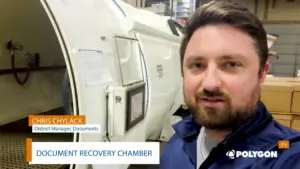Perspectives in Facility Management: AkitaBox’s Todd Hoffmaster
In a recent interview with Todd Hoffmaster, CEO of AkitaBox, he shared his thoughts about his company and its positioning in the facility management technology industry.
Hoffmaster explained that, as one of the organization’s original founders and its CEO, it is his responsibility to support his team as they help educate the world about the opportunities in facility management technology. He feels that AkitaBox has a unique opportunity to positively impact the world around us by identifying and addressing issues that affect facility manager performance. For example, there are challenges that impeded management’s ability to engage in regular preventative maintenance. These professionals also need support in making a strong environmental impact by reducing facility waste and becoming better stewards of their buildings.
Hoffmaster’s early years on his family’s dairy farm in Wisconsin influenced his decision to enter this line of work. He recalls that is was important they maintain their buildings and equipment, since they couldn’t spend money constantly replacing their depreciating assets. This was easy to manage, since it was one or two people doing all the work. Years later, as an architect, he realized the same concept applied to buildings and assets, but instead of coordinating one or two people, a whole department was involved. Hoffmaster then had a discussion with a company co-founder in which they explored this issue in the industry, and the conversation planted the seed for AkitaBox.
Over the years some important trends have impacted the industry. Facility managers understand the value of collecting data on their buildings and assets, but they’re looking for partners to make sure it stays updated and to examine better ways to store their information in an easily accessible and updateable system; many of the data collection trends that Todd has witnessed recently have been direct results of this recognized need. LiDAR scanning technology and automated flight services, such as PrecisionHawk, are all new ways to collect information to create these databases safely and more efficiently. Virtual reality (VR) devices could be added to this list in the future, but they have not made it easier to collect data so far. Other trends, such as prefabricated buildings, require facility managers to educate decision makers. While these buildings are cheaper initially, they still require maintenance to maximize their lifespan, and that isn’t something leadership teams always understand. Facility managers do not always realize the valuable input and guidance they can offer decision makers, but they need to be empowered to communicate what they know.
The team at AkitaBox is continually working toward solutions to these problems. Hoffmaster stated that his company forges partnerships with industry leaders, such as PrecisionHawk, so customers can have more information available to them faster. Education is another goal of AkitaBox, since building managers and their partners don’t always realize the scope and detail of information they need to do their job most efficiently. One direct result is a lack of preparedness for energy consumption audits that larger organizations, such as cities, are performing on their buildings. These audits identify what buildings are energy efficient and which need improvement; the best way to improve building efficiency is though proactive maintenance, instead of expensive, reactive measures to toward compliance with new energy standards.
Hoffmaster believes that AkitaBox is uniquely positioned to slowly begin to see all the integration dots connect for facility management teams. He noted that initially, IoT tools and software didn’t consistently work together, but as pioneers are starting to put pressure on their counterparts to integrate, this is starting to happen. In closing he argued that buildings are the world’s largest resource and take up the most resources. In the future, he believes we can expect more companies to work together to provide the right solutions collectively.
Click here to learn more about AkitaBox.








